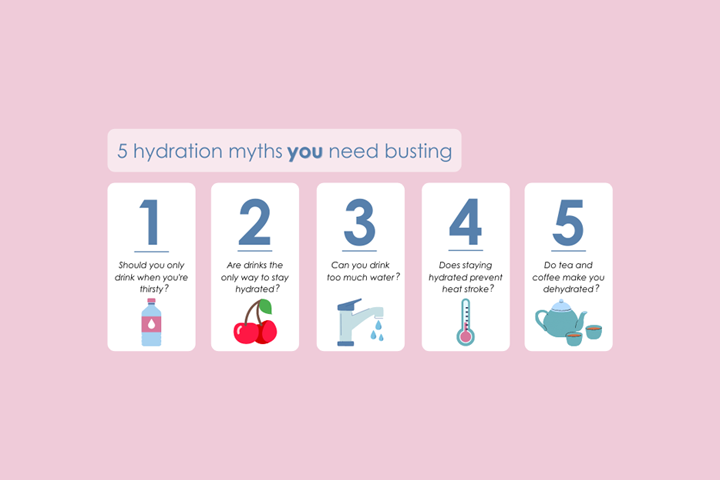
National Office
Please enter the office location/term above to receive results for your closest office as well as information matches
The sun is shining, summer is finally here! But, maybe it’s a little too hot? A study from University of Central London (UCL) has concluded that myths surrounding healthy drinking may be putting older people’s health at risk. So, let’s get our hydration caps on and bust some myths.
No! This is a common myth that unfortunately just isn’t true. As we get older, our appetite for eating and drinking can decline, so you should drink regularly even if you aren’t thirsty.
The recommended amount of water for older women is 1.6 litres of fluids a day, while older men are advised to drink 2 litres a day. This can differ depending on your activity levels. If you’re an outdoorsy type, then you may need to drink slightly more than the recommended amount.
Water is a guaranteed source of hydration, however contrary to popular belief, it’s not the only way to stay hydrated. Food is a fantastic source of water and can be an easier and more palatable way of staying hydrated if you find drinking enough fluids difficult. Here’s a few examples of foods to help fight off dehydration:
Only 80% of our body’s water comes from fluids, the remaining 20% comes from the food that we eat, so make it count, treat yourself to a tomato!
Yes, it’s definitely possible to drink too much water. By consuming too much water, you can cause sodium levels in the blood to drop to very low and potentially dangerous levels.
For most people, it might not be an issue as functioning kidneys will absorb/filter water appropriately. However, if you have kidney, liver, or heart problems then it’s definitely something you should consider.
If you’re someone living with dementia or Alzheimer’s, monitoring intake of water can be tricky as it’s easy to forget when you last had a glass of water. With the support of a private home care service, your Care Professional can help you keep track of your water intake.
Staying hydrated does not prevent heat stroke, however, being dehydrated does pour fuel on the fire. Heat stroke is when your body temperature rises to very high levels; which is extremely dangerous. Unfortunately, being dehydrated raises your body temperature which puts you at higher risk.
If you’re concerned about getting heat stroke, here’s some tips to prevent this:
This is a pretty common misconception, but luckily for you early risers, coffee and tea are fine! According to the article published by UCL:
“Many misconceptions exist – for instance, that thirst is a reliable indicator of when you need to drink, when this may no longer be the case for older people. Another myth is that you have to drink water – in fact, tea, coffee and juices all count.”
So there you have it, 5 hydration myths busted! The summer months are great fun and a fantastic time to be out and about, but don’t forget the importance of hydration, it could save your life!
Click here for more information on how Radfield Home Care’s Personal Care service can help you achieve your hydration goals.
If you would like to find out more about Radfield Home Care and how you can join the team, you can visit www.radfieldhomecare.co.uk or contact your local office.
Get in touch with your local Radfield Home Care office today and find out more about the support we offer and the difference we can make.